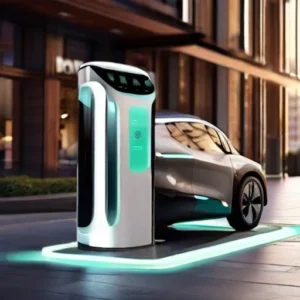
Introduction: Embracing the Electric Shift
Hello, fellow Aussies! Have you noticed more electric cars on the road lately? Yeah, me too. It’s not just a passing trend; electric vehicles (EVs) are becoming a big part of our driving future here in Australia. And why not? They’re cleaner, greener, and can be kinder to your wallet in the long run. Today, we’re diving into the world of home charging for electric cars. Whether you’re a proud EV owner or pondering the switch, this guide is for you to make you understand about home electric car charging in Australia.
From understanding the basics to navigating challenges and looking towards the future, we’ll cover everything you need to know about charging Electric car at Home. Let’s gear up for a journey into the electric horizon!
The Rise of Electric Vehicles (EVs) in Australia
Electric vehicles are zooming into the mainstream, with sales skyrocketing in recent years. It’s clear that Australians are getting on board with the electric shift, fueled by a desire to reduce emissions and embrace cleaner, sustainable transport options.
Environmental And Economic Benefits of Going Electric
Going electric isn’t just good for the planet; it can be great for your wallet too. Imagine waving goodbye to petrol stations and reducing your maintenance costs. Plus, you’re playing a crucial role in reducing carbon emissions. Win-win, right?
Overview of the Charging Electric Car At Home in Australia Landscape
Before we dive into the nitty-gritty, let’s understand the lay of the land. Home charging is becoming more accessible and convenient, making the transition to electric smoother than ever before. Ready to plug in? Let’s get started.
1. Understanding the Basics of Charging Electric Car at Home
Getting to grips with home charging is easier than you think. Let’s break it down.
Types of Electric Vehicles
Battery Electric Vehicles (BEVs): Pure electric, no petrol tank in sight. These are your Teslas, Nissan Leafs, and the like.
Plug-In Hybrid Electric Vehicles (PHEVs): A mix of electric and petrol, these can switch between fuel types when needed.
Charging Levels Explained
Level 1: Standard household outlets: Yes, you can charge your EV with the same outlet you plug your phone into, but it’ll take a while.
Level 2: Dedicated home charging stations: Faster and more efficient, this is the go-to for home charging.
Level 3: Fast charging (not for home use): This is what you use when you’re on the road and in a hurry.
Safety and Compliance
Safety first, folks! Always use a licensed electrician for installation to meet Australia’s strict electrical standards and certifications. Plus, regular checks can keep your charging safe and sound.
2.Setup Needed for Charging Electric Car at Home
Ready to set up a charging station for your electric car at home? Here’s what you need to know.
Choosing the Right Equipment
Consider speed, compatibility with your vehicle, and how future-proof the system is. Some popular choices in Australia include brands like ChargePoint and Zappi.
Installation Process
Make sure your home’s electrical system can handle the charger. Hiring a seasoned electrician and obtaining any necessary permits is key.
Costs and Incentives
The upfront cost might make you gulp, but the long-term savings are sweet. Don’t forget to check for government rebates and incentives, too!
Electricity pricing and solar offset options
Thinking about how home charging will affect your electric bill is crucial. With some smart choices, like charging during off-peak hours or using solar power, you can keep costs down.
3. The Impact of Charging your Electric Car at Home on Your Electricity Bill
Understanding Electric Rates and Consumption
Got your bill handy? Good, because understanding peak vs off-peak rates can save you a bundle.
Smart Charging Strategies
Scheduling your charging for the cheapest times and considering solar can make a big difference.
Tips for Minimizing Costs
Choosing an energy plan that suits your EV lifestyle and investing in efficient equipment can help keep those bills in check.
4. Navigating Challenges and Solutions of installing or charging Electric Car at Home
Technical Hurdles
Limited home power capacity? You might need to upgrade your system, but a good electrician can guide you through.
Lifestyle Adjustments
Longer charging times mean planning is key. Factor charging into your daily routine to stay juiced up and ready to go.
Overcoming Range Anxiety
Worried about running out of charge? A bit of planning and the growing network of public chargers can ease those fears.
5. The Future of Home Electric Car Charging in Australia
Innovations in Charging Technology
Wireless charging and faster solutions are on the horizon, promising an even smoother EV experience.
Government and Industry Support
There’s solid backing for EV infrastructure and renewable energy, signaling a bright future for electric driving in Australia.
The Role of Community and Culture
The EV community is flourishing, and as more Aussies embrace the shift, we’re paving the way for a culture of sustainability.
Conclusion: Stepping Into a Cleaner, Greener Future
Embracing electric vehicles is more than just a personal choice; it’s a step toward a cleaner, greener Australia. With home charging becoming easier and more accessible, there’s never been a better time to join the electric revolution. Let’s drive into a sustainable future together, shall we?
Frequently Asked Questions (FAQs)
Yes, but choosing the right one is easier than you think.
It’s best to use a licensed electrician to ensure safety and compliance.
It varies, but with a Level 2 charger, you’re looking at a few hours for a full charge.
It depends on your electric rates and car, but it’s generally cheaper then filling it up on petrol.
Absolutely, and they’re worth checking out to save some cash.
Consulting with a professional electrician can help you navigate any needed upgrades.
